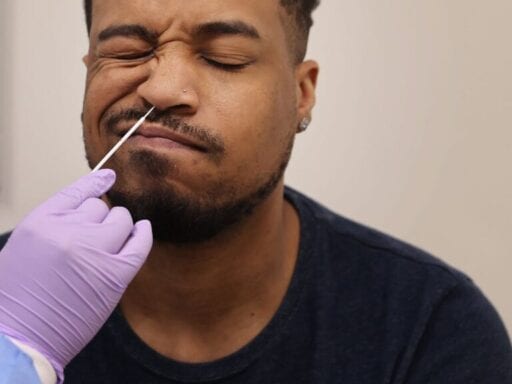It’s the third at-home sample collection kit given emergency authorization.
The Food and Drug Administration granted “emergency use authorization” to a new coronavirus testing kit on Saturday that allows people to submit self-collected nasal samples to labs by mail.
The new test, by Everlywell Inc, is the third at-home sample collection kit given special expedited approval from FDA under an emergency use authorization — which uses a standard lower than the one the FDA normally adheres to for new treatments and products, but allows for the use of items the administration thinks it is “reasonable to believe” will be effective during a public health emergency. The company previously faced congressional questions after it appeared to market a similar product for home use without FDA review; it told the New York Times it meant for its kits to be used only by health care providers pending federal approval.
The emergency use authorization will increase the number of credible sample collection kits Americans can use to test themselves from home, allowing them to avoid the risk of exposure at a medical facility, and also reduce the odds of spreading the virus if they are in fact positive.
Jeffrey Shuren, director of the FDA’s Center for Devices and Radiological Health, said the speed with which the administration was able to give the kit a green light “was a great example of public-private partnerships, in which data from a privately funded study was used by industry to support an EUA [emergency use authorization] request.”
Here’s how the testing process works, as reported by the New York Times: Someone who wants to get tested takes an online survey to ensure they meet federal guidelines to receive a test. Those guidelines suggest a person should be exhibiting symptoms or have had contact with symptomatic individuals before requesting screening.
The results of the online survey are then reviewed by health care providers affiliated with Everlywell’s telemedicine partner. If the survey shows the person is at risk of infection, the collection kit ships out immediately. The person who receives the kit collects a nasal sample, places it in a saline solution, and then ships it overnight to a certified lab. The whole process, from taking the survey to getting results, is meant to take three to five days. Each kit costs $135, and according to Everlywell, will be available in late May.
There are two other at-home sample collection kits that have also been granted emergency use authorization by the FDA; one also uses nasal samples, and the other uses saliva.
As Recode’s Sara Morrison has reported, the FDA has been working to grant emergency use authorizations in part to push back against fraudulent vendors making false claims about at-home testing.
“In late March, the FDA even issued a stern warning for American consumers to be on the lookout for unauthorized or fraudulent test kits,” Morrison wrote. “One company, MicroGen DX, later told [STAT News] that it didn’t need FDA authorization for its at-home collection test at all. The FDA has also cracked down on shipments of unauthorized tests from other countries.”
The FDA has not authorized any tests that can be done entirely at home — that is, sample collection and diagnosis. While a number of companies are working on such tests, experts say home tests with rapid results could be months away.
Support Vox’s explanatory journalism
Every day at Vox, we aim to answer your most important questions and provide you, and our audience around the world, with information that has the power to save lives. Our mission has never been more vital than it is in this moment: to empower you through understanding. Vox’s work is reaching more people than ever, but our distinctive brand of explanatory journalism takes resources — particularly during a pandemic and an economic downturn. Your financial contribution will not constitute a donation, but it will enable our staff to continue to offer free articles, videos, and podcasts at the quality and volume that this moment requires. Please consider making a contribution to Vox today.
Author: Zeeshan Aleem
Read More



